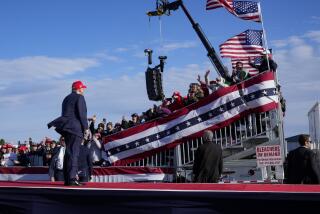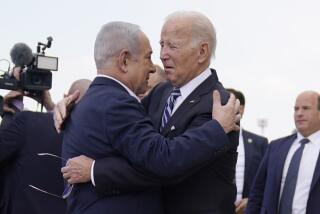Top Palestinian Crosses Divide to Israeli Knesset
- Share via
JERUSALEM — Ahmed Korei, who heads the legislature of the Palestinian quasi-state, on Monday visited the legislature of the Israeli state. The two institutions are just 8 1/2 miles apart, but judging from the commotion caused, Korei’s short trip crossed a world of psychological and historical barriers.
Korei, better known as Abu Alaa and a chief negotiator of the landmark Oslo peace accords, became the highest-ranking Palestinian official ever to grace the marble halls of the Israeli Knesset, or parliament, in an event of mutual recognition unimaginable during the chilly Israeli-Palestinian bitterness of the past three years.
Lower-ranking Palestinian officials have occasionally paid calls on individual Knesset members. But Korei’s visit, coming as the new Israeli government is pushing to revitalize the peace process, sent a signal that liberal lawmakers here are serious about bridging divides in the Mideast.
Korei was invited by his de facto counterpart, Knesset Speaker Avraham Burg, a flamboyant and spirited politician who assumed office three weeks ago on behalf of the center-left Labor Party of new Prime Minister Ehud Barak.
“The readiness of both sides to enhance the peace process in every possible way is very sacred to both of us,” Burg said, praising the courage of the man he repeatedly called Mr. Abu Alaa.
“This is an important stage, when everyone is hoping that the peace process will come back on track again,” Korei responded, also commending Burg for having the courage to invite him.
The two spoke at a crowded news conference in a Knesset hall, seated before an Israeli flag and three mammoth floor-to-ceiling tapestries by Marc Chagall that depict the history of the Jewish people, from the creation of the world through the exodus from Egypt, the bestowing of the Ten Commandments and the founding of Israel.
Minutes into their news conference, right-wing legislator Benny Elon burst onto the scene, shouting at Burg for having the temerity to allow Korei an official Israeli platform.
“Why this contempt of your [official] status by exploiting it to express your private opinion?” he demanded angrily.
“Todah rabah,” Burg responded calmly. “Thank you very much. Between the extremist ‘no, no, no,’ and a dialogue even about the toughest issues, I prefer the latter.”
Earlier, Korei arrived at the Knesset in a black Mercedes with official Palestinian Authority license plates.
Burg, wearing his trademark robin’s-egg blue kippa, or skullcap, met Korei at the sculpted wrought-iron gates of the Knesset and walked him up the long paved esplanade to the building, pausing at an eternal-flame memorial to Jewish Holocaust victims. A mob of journalists and photographers engulfed the pair and scuffled with security guards.
All those involved seemed to offer their own interpretation of Korei’s very public “private” visit.
As far as several Palestinian journalists were concerned, this was a visit of state that merited the unfurling of a Palestinian flag. (Too soon for that, the Israelis would say.)
As far as Israel’s right wing was concerned, Monday’s spectacle was an abomination.
“The point is, how do we keep our sanity [and avoid] national suicide?” Elon asked. “If the Knesset speaker believes that it is a stately thing to bestow Abu Alaa with a status equal to his own in such an official way, and to lead to the establishment of a Palestinian state in this way, if he thinks that is cute, well, such cute things will destroy our country.”
A number of Israeli politicians were happy to see Korei walk through the Knesset because, they said, it showed a senior Palestinian official recognizing Israeli sovereignty over Jerusalem.
Not so, said Korei. His appearance in no way endorses Israel’s 1967 annexation of East Jerusalem, he said.
On this point, during a news conference that shifted from Hebrew to Arabic to English, Burg and Korei politely agreed to disagree. Both said the status of Jerusalem, the holy capital claimed by both peoples, would have to be decided in future negotiations.
Korei reciprocated Burg’s gesture and invited him to visit the Palestinian Legislative Council, located in Ramallah in the West Bank. Burg said he will “hope and pray to God” that Palestinian Authority President Yasser Arafat will address the Knesset before Burg leaves office.
Arafat and Barak are scheduled to meet tonight at the Erez border crossing, where they held their first face-to-face meeting two weeks ago. They are expected to discuss some of the specifics of the Wye Plantation agreement that was signed by Israel and the Palestinians in October.
Hisham Abdullah, a Palestinian reporter with the French wire service Agence France-Presse, has worked as a journalist in Jerusalem for 14 years, yet Monday was the first time he entered the Knesset.
“The first thing I think about is how the Israelis have come such a long way in 50 years and have achieved so many things in politics and democracy and institutions,” Abdullah said. “And then I compare with what we’ve achieved in that time, and I find the opposite. It’s been a retreat.”
As for Israeli democracy, Burg was forced to cut short his time with Korei when the warning bell sounded for Monday afternoon’s Knesset session: a scheduled debate on three no-confidence motions against the Barak government.
More to Read
Sign up for Essential California
The most important California stories and recommendations in your inbox every morning.
You may occasionally receive promotional content from the Los Angeles Times.














